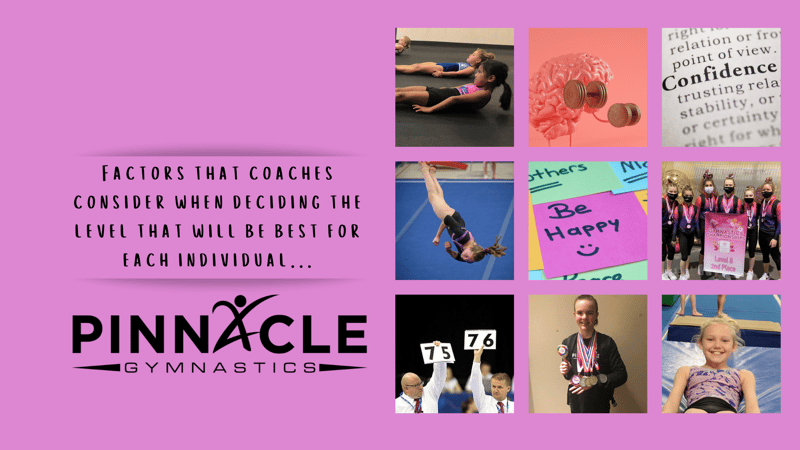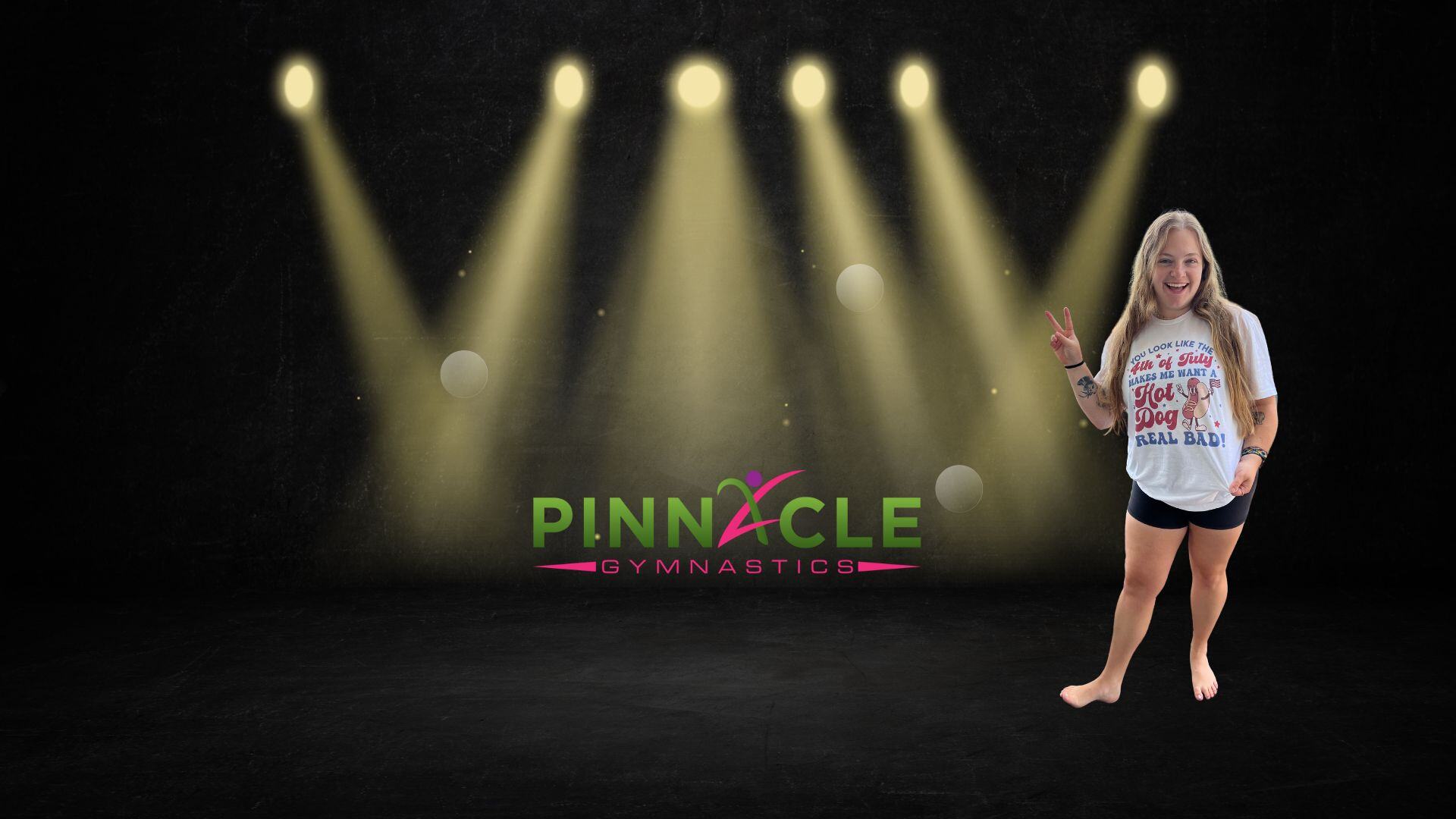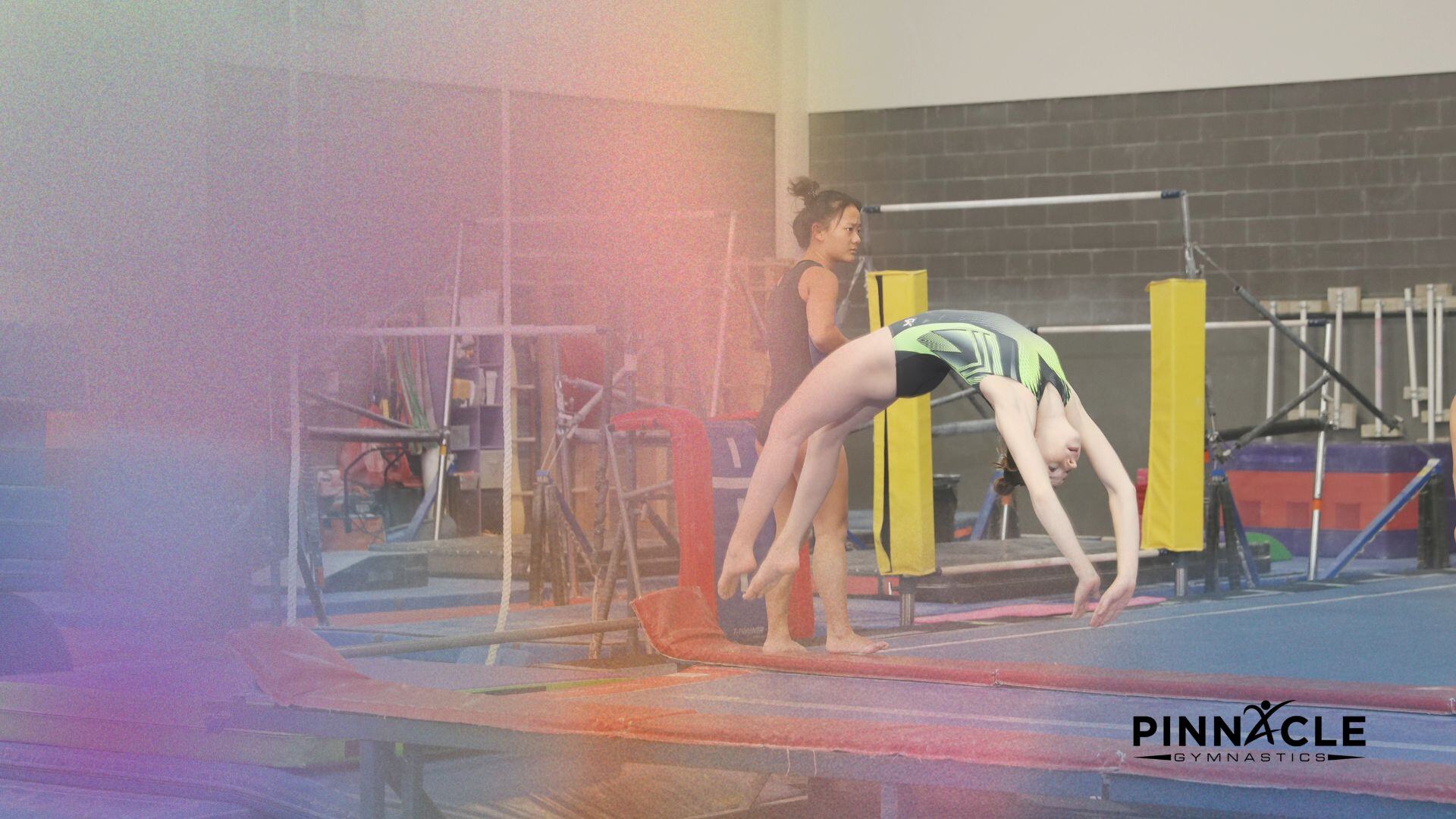As the competitive season is winding down, gymnasts, parents and coaches are all starting to think and plan for what comes next. For compulsory (Level 3-5), Xcel Bronze, Silver and Gold the season concludes with the State Meet. For the optional levels and Xcel Platinum and Diamond the season may continue on to Regional meets. Regardless, at the end of the season decisions are made on what should come next for each individual athlete.
 How are level/program recommendations made for each athlete?
How are level/program recommendations made for each athlete?
Coaches work hard to determine the team and level that allows each child to have the best possible experience in gymnastics. Below are a few factors that we consider when deciding the level that will be best for each individual.
- Physical Readiness is one of the first factors coaches consider is if the gymnast is physically ready for the challenges of the level. Do they have the required strength, flexibility, and skill set to build on? Strength, flexibility and a strong foundation are required to safely teach the gymnast the next set of skills. Gymnastics is best taught through a series of skill progressions and rushing the process because the gymnast is not physically or mentally prepared results in poor gymnastics skills and an unsafe environment.
- Mental Readiness is as important as physical readiness. A gymnast's ability to focus for an extended period of time, understand technical corrections, communicate, and overcome obstacles becomes more important with each level. Many times young gymnasts may be physically ready for the next level, but they need time for their mind to catch up. Moving a gymnast when they are physically ready, but not mentally prepared for the challenge can lead to mental blocks or burn out.
- Confidence is a huge factor in gymnastics. Gymnasts can be physically and mentally ready for the challenge of a new level but without belief in their abilities we are setting a gymnast up for failure. Confidence is absolutely essential to a gymnast’s competitive meet performance. While confidence can always be improved through positive coaching there are times when a gymnast needs a season for their confidence to catch up to their physical and mental abilities.
- Happiness is as important as any other factor. However, sometimes this can be confusing for the parent and gymnast. Often, you will hear that my daughter would be happier moving up even if that means not placing or meeting the special requirements of the level. Or my child would rather repeat the same level for a third year rather than transitioning to a different program. This is happiness in the moment. As coaches we are looking for happiness throughout the competitive season. We are looking for opportunities for your child to learn new skills, beam with pride when they nail a routine, and to jump up and down with excitement when their team reaches a goal. We want to see your child happy throughout the season. Keep in mind, the number one reason kids quit a sport is because it is no longer fun.
- Group placement also comes into play when deciding which level is best for your gymnast. While, the decision of what level your gymnast competes is never based solely on others, coaches would be lying if they said it doesn't come into play. Sometimes when all the other factors do not point a clear direction coaches decide it would be better to move up or repeat to be with a team or with kids of similar age and ability.
- Scores and placement also come into play, but not to the extent that many parents and gymnasts think. There are certain required mobility scores and rules that must be met. However, the majority of the time if the child is physically and mentally ready as well as confident and happy the scores will match the situation.
.png?width=800&name=White%20Simple%20Beautiful%20View%20Blog%20Banner%20(1).png)
What are possible options for my gymnast?
Assuming your gymnasts wants to continue with competitive gymnastics there are generally four options. The first three options are all very common. The last does occur but not nearly as frequently.
- Repeat their current level
- What are the benefits of repeating a level?
- Increased confidence.
- A chance to polish the current skill set.
- An opportunity to work ahead to be stronger when it is time to move up.
- A chance to be the leader both in practice and on the competitive playing field.
- I have yet to have an athlete repeat a level who did not benefit in one way or another.
- What are the benefits of repeating a level?
- Move up a level
- What is the benefit of moving up?
- An opportunity to learn a new skill set.
- New challenges are presented in practice and at competitions.
- Athletes may be ready for a new schedule.
- An opportunity to work with gymnasts who are at a higher level.
- What is the benefit of moving up?
- Change programs
- Why one program over another? The why comes from the individual needs of the athlete and their family. A few of the major factors coaches consider are:
- Skill Set - Does your child have the very specific skills, strength, and flexibility that is set by the DP compulsory levels or would they benefit from a wider variety in skill selection that the Xcel program offers?
- Event Specialist - Is your child a beam queen? Maybe, they have been tumbling all their life and the other events are still coming along. This is a huge benefit of Xcel Gymnastics. Xcel allows the coaches to challenge your child on their strengths while improving their weaknesses with skill selection.
- Age - Yes, age does play a factor. We like to have training groups that are similar in age. This allows for better environment for the athlete.
- Schedule - Does your athlete and or child need more flexibility in their schedule? Maybe, they are a multi-sport athlete or maybe they are just looking for a little bit lighter load to balance school and gym. Xcel might be the better fit.
- Why one program over another? The why comes from the individual needs of the athlete and their family. A few of the major factors coaches consider are:
- Skip a level (uncommon)
- When do gymnasts skip a level?
- Rarely, with the exception of level 5 & 6. Level 5 and 6 have many of the same skill requirements. Different levels can be better for different athletes. Some athletes benefit from doing Level 4, 5 and 6 and others only need one of the levels, either 5 or 6. It all depends on the athlete. Different levels have different challenges which may benefit different athletes.
- The only level that gymnasts are allowed to skip without competing and scoring a minimum score is Level 6. If a gymnast skips level 5 they are required to compete Level 5 to get a mobility score prior to competing level 6.
- When do gymnasts skip a level?
.png?width=800&name=White%20Simple%20Beautiful%20View%20Blog%20Banner%20(2).png)
There are numerous quotes about all roads leading to the same destination. There is certainly some truth to this in gymnastics. The goal of coaches is to choose the road with the fewest obstacles and the most opportunity for growth. Very few people can say they were a competitive gymnast, fewer reach the optional level, and even fewer will become college gymnasts. But, every competitive gymnast should have a chance to enjoy the sport and reap the benefits.
What is going to matter five years from now; the level, division, or program your child completed? Or the lessons, experiences, and memories? When you look back at your child's pictures as a competitive gymnast it will be hard to identify their level in the picture, but a happy face will always be easy to spot.




